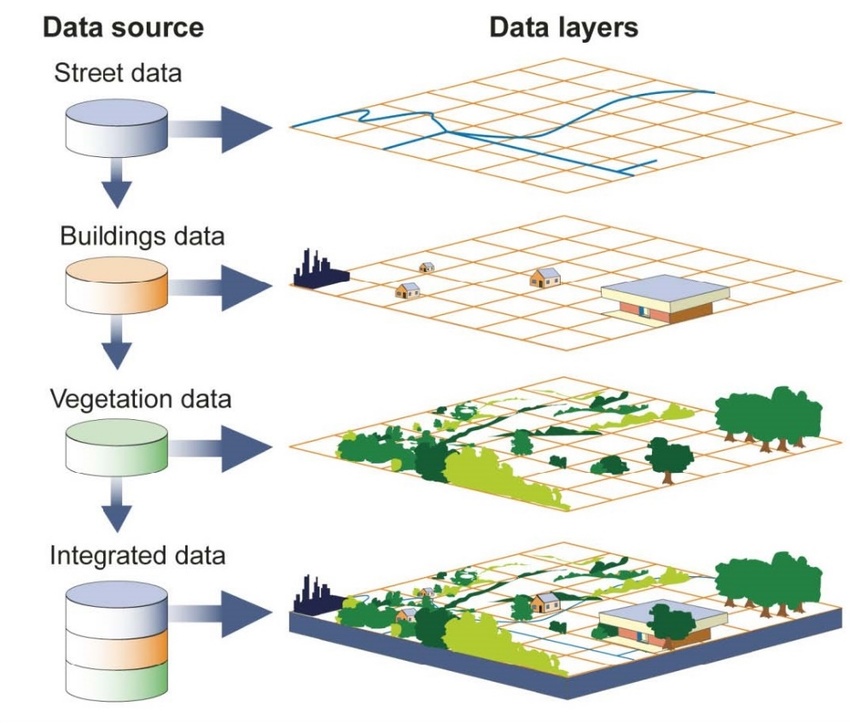Latest GIS practices and integrating them with your design workflow
Geographic Information System (GIS) is a set of tools to interpret, visualize, and analyze geographical data for various applications. TopBIM’s GIS services aim to automate the GIS data generation and conversion to BIM modeling format for effective centralized construction management.
Technologies used with GIS for effective implementation
GIS deploys geospatial technologies or integrates other information systems for leveraging the visualization of geospatial data
Remote sensing technologies are deployed to scan the physical information about the targeted area. Technologies used to assist in remote sensing are satellites, drones, LiDAR, and photogrammetry.
The Internet of Things is the network of smart devices that works to amplify the work of GPS in GIS. The GPS receiver is the central component of this context. These technologies facilitate the collection of geographical data
GPS brings in the particularity to map’s data. It is for capturing and documenting real-time data on a specific location.
The integration of GIS tools with other application workflows and putting them in a comprehensive visualization comes under this service.

From site selection to project management, we leverage spatial intelligence
With more than 151+ projects we have done so far, the majority of them were large public infrastructures. Therefore, we do have experience in providing the following integrated GIS services such as
Converting the captured geographical data into computer-readable form. This data is then manipulated on GIS mapping software for integration and deployment.
We process, analyze, and visualize the GIS mapping data collected by light detection and ranging sensors in our drawing environment.
Parcel maps also touted as property maps are particularly used for the explicit demarcation of properties on the map.
Interpreting multiple photographs captured by remote sensing technologies, to a sensible 3D model that can be utilized in your BIM workflow.
Topographical maps are intended for recording detailed physical attributes such as positioning and elevation, for a particular area of landmass.
We transform the GIS data into a comprehensible digital map format from multiple sources.
This process acts as a central component in the whole GIS service for building development. The collected GIS data can be translated into multiple formats as per their suitable use.
Before starting on any GIS requirement, we determine the precise goal of the project.
Tuned to this, the use of tools and workflow integration is figured out.
Then, the right set of data has to be sought out to visualize the tangible stakes on the project site.
Finally, the most suitable BIM and GIS integration workflow benefits the project with the data extracted and further visualized.
With this much experience, we can deploy datasets from our past project to optimize the BIM-GIS integrated workflow
Not only the selection of state-of-the-art tools but also the human pool that has experience in managing the most complex GIS requirements
In general, GIS is needed for big AEC public infrastructure projects. Therefore, with our in-house skillset, we keep up with the pace and perfection required for the project.
GIS has varied applications but if you specifically need it for design-build operations, Top BIM Company has got all that it takes to deliver the expectations.
Enhance design decision-making and streamline intelligent development effortlessly through our rapid BIM-GIS integration.

GIS services can leverage a wide range of data types for spatial analysis and mapping. These include –
Additionally, crowdsourced data contribute real-time information on points of interest, public sentiment, and traffic conditions.
GIS services have a diverse range of software options available, including both commercial and open-source platforms. Commonly used GIS software includes –
These software tools provide functionalities for spatial analysis, mapping, data management, and visualization. The choice of GIS software depends on individual needs, budget constraints, and user preferences.
To choose the right GIS service, follow these steps:
One should be able to define their requirements and objectives. This is very necessary for determining your budget regarding the application you need to perform with GIS integration. Then, it is totally upon the organization whether they want to perform the GIS operations in-house or outsource the whole service. Generally, it is advisable to outsource as it is a better investment concerning the long run of the operations. This doesn’t end here, even with outsourcing one has to
When evaluating GIS service providers, one should consider their experience especially their ability to handle large complex projects. Second, your operations need and location should be compatible with your selected GIS service provider. This can be analyzed through the provider’s clientele and past work.
Several variables, including project complexity, data collection, processing, analysis, customization and development, and training and support, can affect how much GIS services cost. Open-source GIS software is often free, whereas commercial GIS software may require licensing payments.
The cost of acquiring data depends on the type and source of the data, and the complexity of processing and analysis might affect prices.
Then further costs are raised by customization, development, training, and extra support services.
Different service providers have different pricing strategies, which can be on an hourly basis, project basis, or even sometimes subscription-based.
The best way is to consult a trusted GIS service provider of your needs to assess the most optimal pricing options.